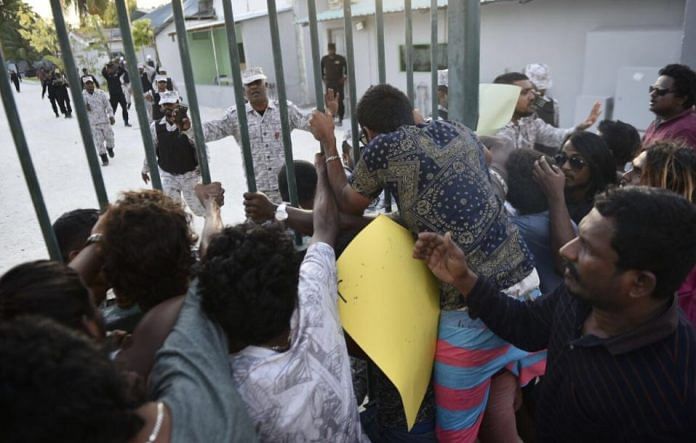Even though observers saw it coming, it was allowed to slide because the Maldives is too small, too insignificant in the general scheme of things.
The Maldives has officially reached meltdown and this has been a decade in the making. The signs were all there, the support for an exiled former President, the unaddressed development issues, the growing frustration of unemployed youth, the formation of gangs and their use by politicians, a fallout between brothers that created fissures in the political demography. This was exacerbated by the advent of Saudi influenced Salafist NGOs and the inevitable formation of a shadowy parallel government or an alternative ‘deep state’, so as to speak. These were all contributors to the present crisis and the implications go far beyond the tiny island nation’s borders.
Last week, the Supreme Court ordered the release of a group of opposition politicians. It also ruled that the 2015 trial of former President Mohamed Nasheed, who is living in exile, had been unconstitutional. The country’s police commissioner Ahmed Areef declared that he would enforce the court’s ruling — in response, the government of President Yameen sacked him. Former President Maumoon Abdul Gayoom, who has allied himself with the opposition, was also placed under arrest after police broke into his house for “investigation”. This is widely regarded as tantamount to a declaration of martial law in the Maldives.
The army has now been ordered to resist any attempt to impeach or remove President Yameen. The Maldives Broadcasting Commission has warned that private TV stations would be shut down if their coverage was deemed to pose a “threat” to “national security” thus further gagging the media.
Even though the observers saw it coming, it was allowed to slide because, let’s face it, the Maldives is too small, too insignificant in the general scheme of things where the Asia Pacific theatre was concerned.
We now have an exiled President Nasheed out on bail and trying to manage an election campaign long distance and actually succeeding. He is joined by an ally of convenience in the form of former President of Maldives for 30 years and a near autocrat Maumoon Abdul Gayoom who had parted ways with his half-brother the current President Yameen Abdul Gayoom. Politics indeed makes strange bedfellows and the person who was instrumental in dethroning Nasheed has now lined himself alongside him against his own brother.
Maldives’ current problems are related to ideological spread, security and corruption.
After the 2004 tsunami, the Maldives suffered crippling infrastructural losses and heralding the arrival of the NGOs. Many were Saudi-sponsored and propagated their own brand of Wahhabi Salafist ideology making gradual inroads into an already disenfranchised society, the most aggressive one being Jammiyathu Salaf. The political tumult of the 2013 elections and the rise of President Nasheed was a brief flash of hope for a majority of the Maldivians. During his initial days as President, Nasheed carried out a number of ambitious reforms, including a public ferry transport system and universal healthcare. Several groups of Islamic nationalists feared that this period of Nasheed’s administration as a plan to destroy Islam in the Maldives.
The efforts of the NGOs finally bore fruit. The opposition managed to capitalise on this and held a huge rally and Nasheed was forced to resign allegedly at gunpoint, after which terrorism charges were slapped on him.
The other factor was the creation of about 30 local gangs, which were a result of unemployment, drug trafficking and these gangs became a tool of governance. The murder of prominent bloggers and social voices like Ahmed Rilwan, Yameen Rashid and others were widely regarded as a part of a clampdown on dissent. Unease increased and so did indignation over widespread indications of corruption and the “selling of islands” and environmental degradation for the purpose of development.
At the same time, Maldives gained notoriety for having the highest number of people who left the country to join the ISIS. Others left to join the Al Qaeda affiliate, Jabhat Al Nusra to fight against ISIS. The Yameen government turned a blind eye and downplayed the issue. Instead, he hired the firm of Cherie Blair (wife of former UK Prime Minister Tony Blair) to enhance the government’s “public image” but this proved ineffectual and the contract was cut short.
Into this already stirred beehive of issues entered China. The aggressive approach adopted by China in its strategic trade and port usage treaties with Sri Lanka mirrored its agreements with the Maldives.
The now-beleaguered Yameen struggles to remain in power and relies upon his partner Ahmed “Sun” Siyam the leader of the MDA (Maldivian Democratic Alliance) who has 7 MPs in the parliament and is assisted by his deputy MP Mauroof. Ahmed Siyam is also the chief of the MNDF and owns a number of luxury resorts in the Maldives.
The average Maldivian wants a job, yearns for better education and cannot afford to go to Singapore or India for medical procedures. What they see is a small group of businessmen getting richer while there is no visible model of sustainable development.
Shirish Thorat is a former Indian police officer and served as a security and risk consultant to the Maldivian government in 2010-2012. Thorat is the author of the book ‘A Ticket to Syria — A story of the ISIS in Maldives’.




Funny that we have more foreign workers the locals. And there is plenty jobs here to fill. We have zero poverty. Stop this fake news.